Mystery "Words about Igor's regiment"
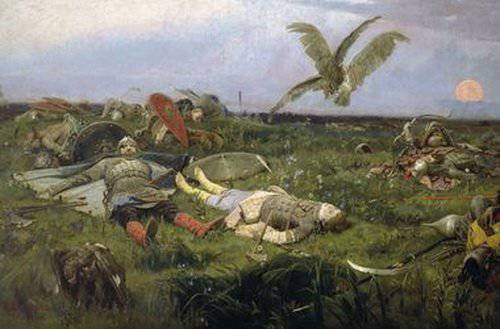
Among the ancient Russian books, one always caused mystical horror in me - “The Word about the regiment of Igor”. I read it in early childhood. Eight years old. In the Ukrainian translation of Maxim Rylsky. This is a very strong translation, not much inferior to the original: “Having looked at Igor on the sun, that was the first thing to do — vysko darkness began to smoke, saying to friends:“ Brattya my, my friends! Luchche us chopped up boutiques, nizh is full of love! ” And here it is: “O Ruska to the earth, already ty behind the grave!” (In Old Russian, since it was not the translator who wrote, but the author of the great poem himself, the last phrase reads: “O Ruska for the earth, already behind the Shelomianem!”) . "Silk" is a hill that looks like a helmet, a tall grave in the steppe.
What terrified me? Do not believe it: most of all, even then I was afraid that the “times of the first strife” would return and my brother and brother would rise. Was this a premonition of what awaits our generation? I grew up in the Soviet Union - one of the strongest states in the world. The sense of security that the Soviet people had then, the current Ukrainian children can not even imagine. Wall of China in the Far East. Western group of Soviet troops in Germany. Nuclear shield overhead. And the song: “May there always be sunshine! May I always be! ”
At school we were taught that Kievan Rus was the cradle of three fraternal peoples. In Moscow, the rules of Brezhnev - came from Dnepropetrovsk. There was no reason to doubt that the nations are fraternal. The Moscow engineer received as much as the Kiev engineer. Dynamo Lobanovsky won one USSR championship after another. A bum not only on Khreshchatyk (nowhere in Kiev!) Was to be found day or night. And yet I was afraid. I was afraid that this undeserved happiness would go away. Smoot, feudal fragmentation - these words haunted me even then, like a nightmare. Probably, I had a gift of premonition.
And when in the 1991 year in Belovezhskaya Pushcha three new “feudal lords” divided us, like the princes of Smerds once were, and we only silently listened, and the borders lay between the former fraternal republics, I remembered “Word of the Regiment ...” again. And he constantly recalled in the “gangster 90”, when new “princes” shared everything around, as did Igor’s contemporaries. Didn’t it sound modern? ”“ Brother began to say to brother: “This is mine! And that is also mine! ” And the princes started for a small "very great" rumor, and forged themselves to sedition, and the rushes from all countries came with victories to the land of Ruskaya "? The author of "The Word ..." determined the whole essence of our troubles 800 years ago, at the end of the XII century.
After long oblivion, "The Word of Igor's Regiment" was discovered in 90 of the 18th century by Count Musin-Pushkin, a former adjutant of Catherine's favorite Grigory Orlov. Upon his retirement, he began collecting old books and came across a manuscript collection in one of the monastic libraries near Yaroslavl. It contained the same mysterious text, which is now known to anyone.
The find caused a sensation. Patriots of Russia exulted. Finally, we have unearthed a masterpiece, comparable to the French "Song of Roland." And maybe even better! Young Karamzin posted an enthusiastic note in the Hamburg Observer of the North, where there were such words: “In our archives we found an excerpt from the poem“ Song to Igor Soldiers ”, which can be compared with the best Ossian poems and which was written in the XII century by an unknown writer” .
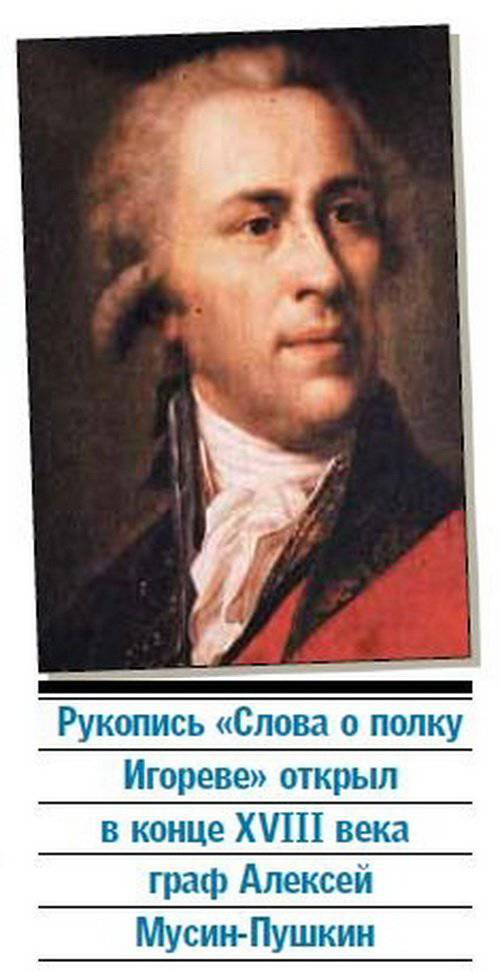
TWO-LOOK IGOR. Almost immediately doubts arose about the authenticity of the poem. The manuscript of The Tale of the Battle of Igoreve burned down in Moscow in 1812, during the war with Napoleon. All subsequent reprints were made on the first printed edition of 1800 of the year, entitled "The Iroic Song of the Campaign against the Polovtsy, the Prince of Novgorod-Seversky, Igor Svyatoslavich." Not surprisingly, it was the French who later began to assert that the “Word ...” was a fake. Who wants to admit that your countrymen destroyed, like barbarians, the great Slavic masterpiece?
Chivalrous Igor, however, was not as white as the author of the Lay ... portrays him. He caused sympathy in Russia when he became a victim - he was captured by the Polovtsy. We always forgive the former sins of the sufferers.
In the 1169 year, according to the Tale of Bygone Years, the young Igor Svyatoslavich was among the gang of princes who robbed Kiev. The initiator of the attack was Suzdal Prince Andrei Bogolyubsky. Subsequently, already in the 20th century, some of the nationalist Ukrainian historians tried to present this campaign as the first hit by the “Muscovites”. But in fact, Moscow at that time was just a small Ostrohk, who did not decide anything, and for some reason in the allegedly “moskal” army next to Andrei Bogolyubsky’s son Mstislav, for some reason, Rurik from Ovruch’s Ukrainian, David Rostislavich from Vyshgorod turned out to be Kiev!) And 19-year-old Chernigov Igor with his brothers - the eldest Oleg and the youngest - the future “buy-tour” Vsevolod.
The defeat of Kiev was terrible. According to the Ipatiev Chronicle, they robbed all day, no worse than Polovtsy: temples were burned, Christians were killed, women were separated from their husbands and roared children were taken into captivity under crying: “And they took the goods without account, and the church , and the bells were filmed by all these Smolensk citizens, and Suzdalians, and Chernigov, and Oleg's squad ... 3 even the Pechersk monastery was burned ... And there was a moan and sadness, and grief that never stopped, and never-ending tears in Kiev among all people. ” In a word, also strife and grief too.
And in 1184, Igor again “distinguished himself”. The Grand Duke of Kiev Svyatoslav sent a combined Russian army to the Polovtsy. The future hero of the poem with his brother, Vsevolod's inseparable "buy-tour", also participated in the campaign. But as soon as the allies plunged into the steppe, a discussion about methods of dividing up the loot broke out between Prince Vladimir of Pereyaslav and our hero. Vladimir demanded that he be given a place in the forefront - the advanced parts always get more production. Igor, who replaced the Grand Duke in the campaign, categorically refused. Then Vladimir, spitting on the patriotic duty, turned back and began to rob Igor's Seversk principality - not to return home without trophies! Igor, too, did not remain in debt and, forgetting about the Polovtsy, in turn pounced on the possessions of Vladimir - Pereyaslavl town of Gleb, who captured, not sparing anyone.
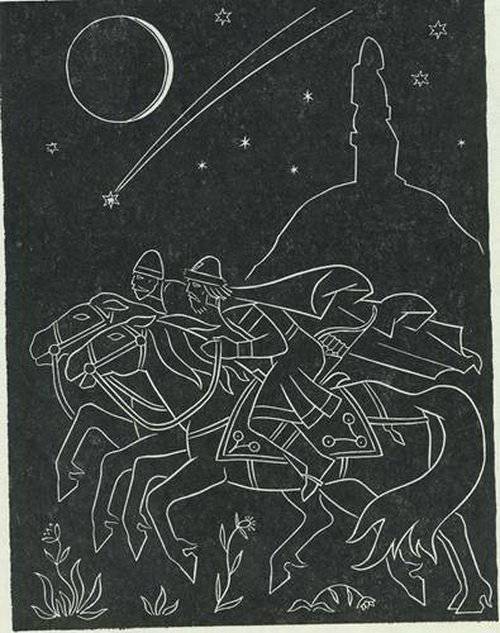
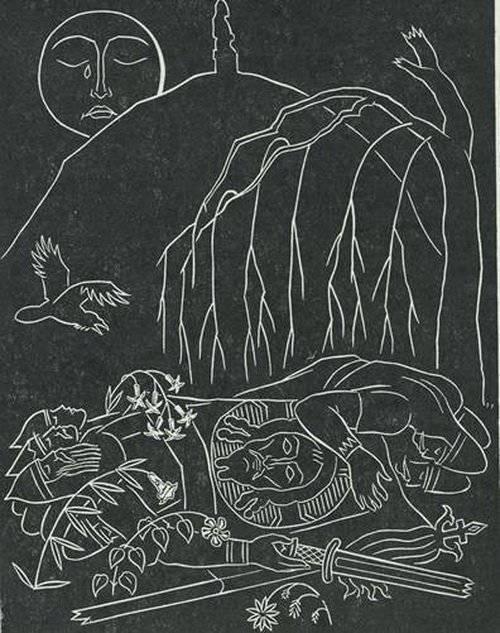
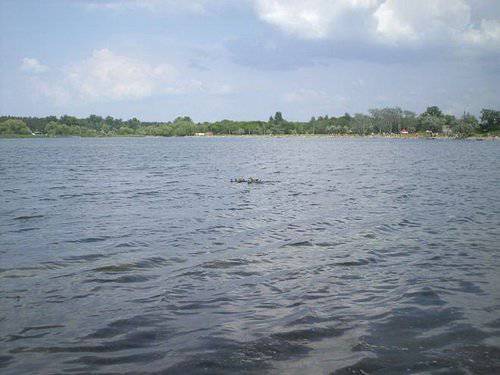
KARA FOR INTER-SPACE. And the following year, the same ill-fated campaign, based on which a great poem was created, happened. That’s just behind the scenes that the composition of the Ipatiev Chronicle contains a work interpreting Igor’s failure from a much more realistic position. By historians, it is conventionally called the "Tale of Igor Svyatoslavich's campaign against the Polovtsy". And an unknown author regards him as a captive of the Novgorod-Seversky prince as a fair punishment for the pillaged Russian city of Glebov.
Unlike "The Word ...", where much is given only by a hint, "The Tale of the Hike ..." is a detailed report. Igor in it is expressed not by stilted calm, but quite prosaically. In "The Word ..." he is broadcasting: "I want a spear to break the edge of the Polovetsky field with you, Rusich, I want to either lay my head down, or drink a helmet from the Don!" And in the "Tale ..." just afraid of the rumor of the people and makes a rash decision to continue the campaign despite the eclipse of the sun, promising failure: "If we are not beating, to return, then we will be ashamed of death worse. Let, as God wills.
God gave captivity. The author of "The Word ..." briefly mentions: "Here Prince Igor moved from slavery to the saddle of gold in the saddle." The chronicler in “The Tale ...” narrates in detail how the leader of a Russian army disintegrating in front of his eyes tries to turn his light cavalry, “kovuys” (one of his vassal steppe tribes), but without catching up with them, falls into the hands of Polovtsy “on the distance of one flight of an arrow ”from its main forces:“ And Igor, caught, saw his brother Vsevolod, who fought hard, and he asked his soul to die not to see his brother fall. Vsevolod fought so much that even weapons in his hand was not enough, and they fought, going around the lake ".
Here on the presumptuous adventurer, according to the chronicler, finds repentance. “And then Igor:“ I remembered my sins before my Lord God, how many murders, bloodshed I created on Christian earth, as I did not spare the Christians, but took the city of Gleb from Pereyaslavl to shield. Then a lot of evil experienced innocent Christians - weaned fathers from children, brother from brother, friend from friend, wives from husbands, daughters from mothers, girlfriends from girlfriends, and everything was crushed by captivity and sorrow. The living envied the dead, and the dead rejoiced, like holy martyrs, with the fire from this life accepting the ordeal. The elders were dying to break, their husbands were chopped and cut, and their wives were desecrated. And all this I did! I am not worthy of life. But now I see vengeance on me! ”
Not so simple were the relationship between Igor and the Polovtsy. According to one of the versions, he himself was the son of Polovchanka. Be that as it may, the Novgorod-Seversky prince willingly entered into alliances with the steppe inhabitants. And no less often than he fought with them. Exactly five years before being captured by the Polovtsian khan Konchak, Igor, together with the same Konchak, set off together to raid Smolensk princes. Having suffered a defeat on the Chertorii River, they literally found themselves in the same boat. Both the Polovtsian Khan and the Russian prince, sitting next to each other, fled from the battlefield. Today - allies. Tomorrow is the enemy.
Yes, and in captivity at Konchak in 1185, the hero of the “Word of the Regiment ...” was by no means disastrous. He even managed to marry his son Vladimir to the daughter of this Khan. Like, what time to lose? The crow was pecking out the eyes of the dead warriors in the steppe, and the prince had already negotiated with the enemy about the future for himself and his inheritance in Novgorod-Seversky. They probably sat next to Konchak in a yurt, drank mare's milk, bargained about the terms of the deal. And when everything was already decided, and the Orthodox priest married the prince and Polovchan, who converted to Christianity, Igor, taking advantage of the gullibility of the steppe people, at night, together with the sympathetic Polovtsi Ovlur, jumped on their horses when everyone was asleep, and rushed to Russia: Polovtsian land on the land of Ruska ... The evening dawn was extinguished. Igor is sleeping. Igor stands out Igor thinks of the field from the great Don to the small Donets. Ovlur horsemen whistled behind the river, told the prince to understand ... Igor flew down as a falcon, Ovlur flowed like a wolf, shaking off the icy dew, tearing his swift horses ... ”.
Who had to get up at night in the steppe and walk on the grass, dropping dew, he would appreciate the poetry of this scene. And the one who never slept in the steppe will probably want to go to the steppe ...
After fleeing from captivity, Igor will live 18 for years and will even become a Chernigov prince. Immediately after the death of Igor in 1203, his brother - that same “buoy-tour Vsevolod” together “with the whole Polovtsian land”, as the Laurentian chronicle writes, will go on a campaign to Kiev: “And they burned and burned not only Podol, but also Gore and the Metropolis of St. Sophia was robbed and the Tithing of the Holy Divine plundered and the monasteries and icons stripped ... ". According to the chronicler, "they did a great evil in the Russian land, which was not the case from the baptism over Kiev itself."
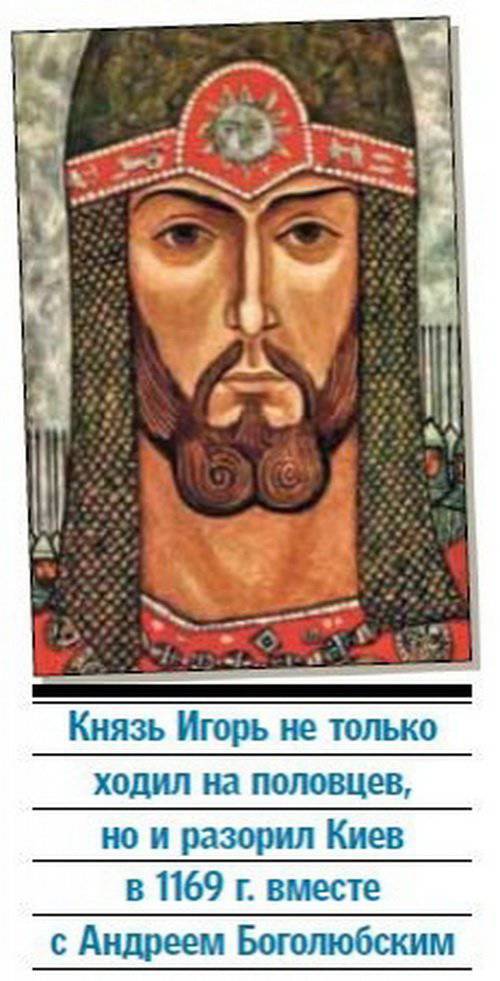
AGAIN AS THEN. I do not want to debunk the poetic images created by the author of the Word about the regiment of Igor. Just pay attention to the fact that Igor was a sinner. There was a lot of blood of his fellow tribesmen on his hands. If he had not gone on his last ill-fated march to the Steppe, he would have remained in the memory of his descendants one of the countless feudal robbers. But rather, I would just get lost in the pages of the annals. Was there such a little minor princes who spent their whole life on strife? But the wounds received not only for his inheritance, but for the whole “land of Russkaya”, a bold escape from captivity, surprised everyone in Kiev and Chernihiv, the subsequent quite decent life as if redeemed the sins of youth. After all, each of us has his last chance, and his finest hour.
But even that is not important. Why did I remember, once again, Igor's campaign in the Polovtsian land? Yes, because the action of the famous poem, which we don’t think about, all its famous military scenes, take place in the present Donbas - approximately in those places where the city of Slavyansk is today. Igor went to the steppe along the Seversky Donets. He was a Seversky prince - the ruler of a Slavic tribe of northerners. The purpose of his campaign was the Don, whose tributary is the Donets. Somewhere near the salt lakes near today's Slavyansk, in an area where there is no fresh water, Prince Igor was defeated by the Polovtsy. Most researchers converge precisely on this version of the localization of the place of the chronicle battle - it was precisely between the Veysovym and Repny lakes in 1894 when building the railway through Slavyansk workers dug many human bones and remnants of iron weapons at shallow depths - traces of the famous battle.
All of us, to one degree or another, are descendants of both Rus and Polovtsy. Two thirds of present-day Ukraine is the former Polovtsian land. And only one third - northern - belonged to Russia. And here again in the same places as eight centuries ago, Slavic blood flows. Strife came again. Brother kills brother. What can not fill my soul with sorrow.
Information